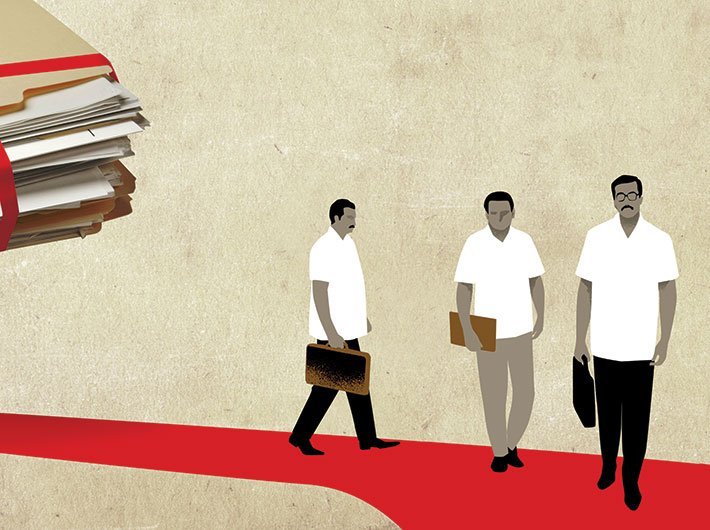New commission to harmonize training standards, create shared faculty and resources, and have supervisory role over all central training institutions: Rs.510.86 crore will be spent over 5 years
Aiming to better equip the bureaucracy and improve governance, the union cabinet chaired by the prime minister on Wednesday approved the launching of a National Programme for Civil Services Capacity Building (NPCSCB).
The NPCSCB will have the following institutional framework:
(i) Prime Minister's Public Human Resources (HR) Council,
(ii) Capacity Building Commission.
(iii) Special Purpose Vehicle for owning and operating the digital assets
and the technological platform for online training,
(iv) Coordination Unit headed by the Cabinet Secretary.
Salient Features:
NPCSCB has been carefully designed to lay the foundations for capacity building for Civil Servants so that they remain entrenched in Indian Culture and sensibilities and remain connected, with their roots, while they learn from the best institutions and practices across the world. The Programme will be delivered by setting up an Integrated Government Online Training – iGOT-Karmayogi Platform. The core guiding principles of the Programme will be:
1. Supporting Transition from 'Rules based' to 'Roles based* HR Management.Aligning work allocation of civil servants by matching their competencies tothe requirements of the post.
2. To emphasize on 'on-site learning' to complement the ‘off-site’ learning,
3. To create an ecosystem of shared training infrastructure including that oflearning materials, institutions and personnel,
4. To calibrate all Civil Service positions to a Framework of Roles, Activities and Competencies (FRACs) approach and to create and deliver learningcontent relevant to the identified FRACs in every Government entity,
5. To make available to all civil servants, an opportunity to continuously build and strengthen their Behavioural, Functional and Domain Competencies intheir self-driven and mandated learning paths.
6. To enable all the Central Ministries and Departments and their Organizations to directly invest their resources towards co-creation and sharing the collaborative and common ecosystem of learning through an annual financialsubscription for every employee,
7. To encourage and partner with the best-in-class learning content creators including public training institutions, universities, start-tips and individual experts,
8. To undertake data analytics in respect of data emit provided by iGOT- Karmayogi pertaining to various aspects of capacity building, content creation, user feedback and mapping of competencies and identify areas for policy reforms.
Objectives
It is also proposed to set up a Capacity Building Commission, with a view to ensure a uniform approach in managing and regulating the capacity building ecosystem on collaborative and co-sharing basis.
The role of Commission will be:
• To assist the PM Public Human Resources Council in approving the Annual Capacity Building Plans.
• To exercise functional supervision over all Central Training Institutions dealing with civil services capacity building.
• To create shared learning resources, including internal and external faculty and resource centers.
• To coordinate and supervise the implementation of the Capacity Building Plans with the stakeholder Departments.
• To make recommendations on standardization of training and capacity building, pedagogy and methodology
• To set norms for common mid-career training programs across all civil services.
• To suggest policy interventions required in the areas of HR Management and Capacity Building to the Government.
iGOT-Karmayogi platform brings the scale and state-of-the-art infrastructure to augment the capacities of over two crore officials in India. The platform is expected to evolve into a vibrant and world-class market place for content where carefully curated and vetted digital e-learning material will be made available. Besides capacity building, service matters like confirmation after probation period, deployment, work assignment and notification of vacancies etc. would eventually be integrated with the proposed competency framework.
Mission Karmayogi aims to prepare the Indian Civil Servant for the future by making him more creative, constructive, imaginative, innovative, proactive, professional, progressive, energetic, enabling, transparent and technology-enabled. Empowered with specific role-competencies, the civil servant will be able to ensure efficient service delivery of the highest quality standards.
Financial implications
To cover around 46 lakh Central employees, a sum of Rs.510.86 crore will be spent over a period of 5 years from 2020-21 to 2024-25. The expenditure is partly funded by multilateral assistance to the tune of USD 50 million. A wholly owned Special Purpose Vehicle (SPV) for NPCSCB will be set up under Section 8 of the Companies Act, 2013. The SPV will be a "not-for-profit" company and will own and manage iGOT-Karmayogi platform. The SPV will create and operationalize the content, market place and manage key business services of iGOT-Karmayogi platform, relating to content validation, independent proctored assessments and telemetry data availability. The SPV will own all Intellectual Property Rights on behalf of the Government of India. An appropriate monitoring and evaluation framework will also be put in place for performance evaluation of all users of the iGOT-Karmayogiplatform so as to generate a dashboard view of Key Performance Indicators.
Background
Capacity of Civil Services plays a vital role in rendering a wide variety of services, implementing welfare programs and performing core governance functions. A transformational change in Civil Service Capacity is proposed to be affectedby organically linking the transformation of work culture, strengthening public institutions and adopting modern technology to build civil service capacity with the overall aim of ensuring efficient delivery of services to citizens.
A Public Human Resources Council comprising of select Union Ministers, Chief Ministers, eminent public HR practitioners, thinkers, global thought leaders and Public Service functionaries under the Chairmanship of Hon'ble Prime Minister will serve as the apex body for providing strategic direction to the task of Civil Services Reform and capacity building.
